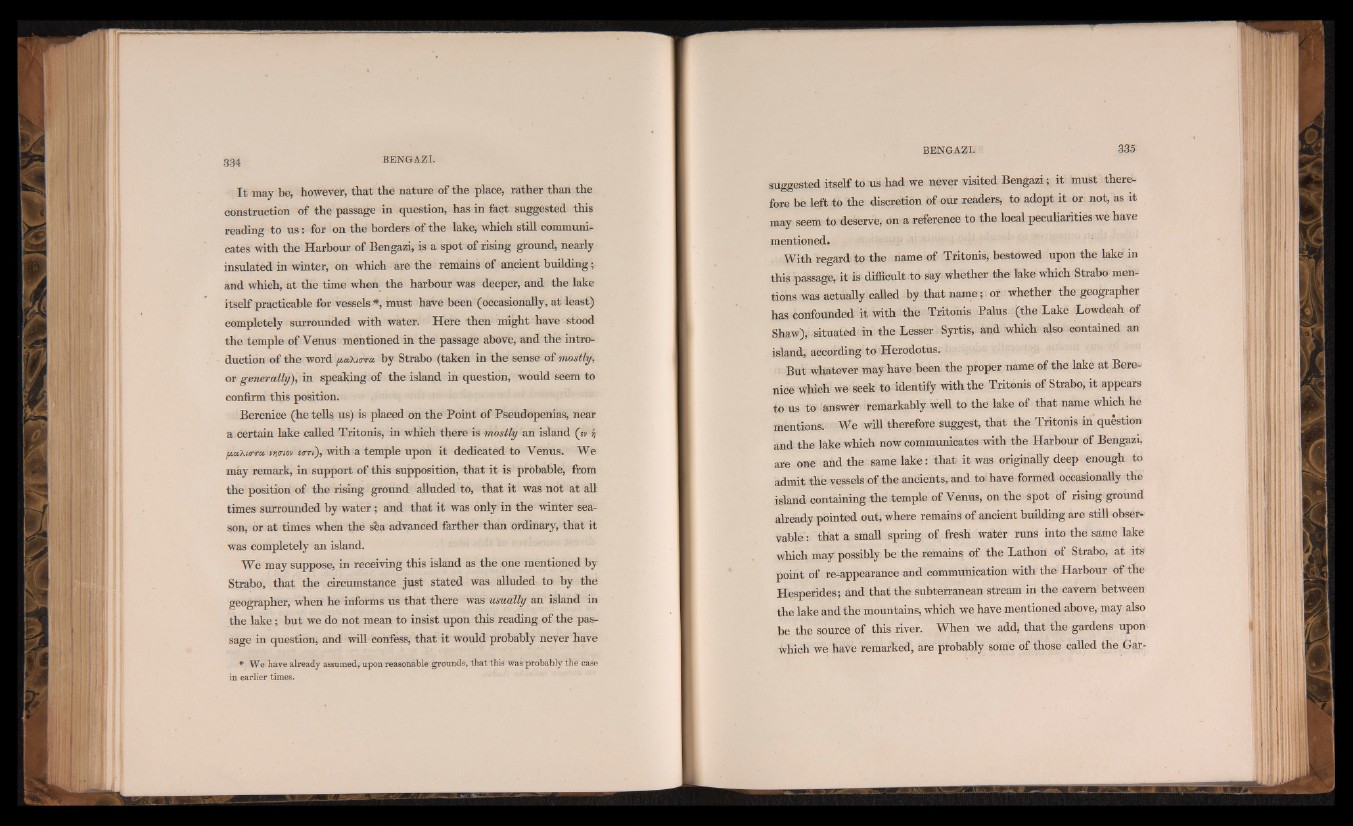
334 BENGAZI.
I t may be, however, that the nature of the place, rather than the
construction of the passage in question, has in fact suggested this
reading to us : for on the borders of the lake, which still communicates
with the Harbour of Bengazi, is a spot of rising ground, nearly
insulated in winter, on which are the remains of ancient building ;
and which, at the time when the harbour was deeper, and the lake
itself practicable for vessels*, must have been (occasionally, at least)
completely surrounded with water. Here then might have stood
the temple of Venus mentioned in the passage above, and the introduction
of the word /jmXiovu by Strabo (taken in the sense of mostly,
or generally), in speaking of the island in question, would seem to
confirm this position.
Berenice (he tells us) is placed on the Point of Pseudopenias, near
a certain lake called Tritonis, in which there is mostly an island (s>> I
(utKitrru. tn/riot eirri), with a temple upon it dedicated to Venus. We
may remark, in support of this supposition, that it is probable, from
the position of the rising ground alluded to, that it was not at all
times surrounded by water ; and that it was only in the winter season,
or at times when the sea advanced farther than ordinary, that it
was completely an island.
We may suppose, in receiving this island as the one mentioned by
Strabo, that the circumstance just stated was alluded to by thé
geographer, when he informs us that there was usually an island in
the lake ; but we do not mean to insist upon this reading of the passage
in question, and will confess, that it would probably never have
* We have already assumed, upon reasonable grounds, that this was probably the case
in earlier times.
BENGAZI. 335
suggested itself to us had we never visited Bengazi; it must therefore
be left to the discretion of our readers, to adopt it or not, as it
may seem to deserve, tin a reference to the local peculiarities we have
mentioned.
With regard to the name of Tritonis, bestowed upon the lake in
this passage, it is difficult to say whether the lake which Strabo mentions
was actually called by that name; or whether the geographer
has confounded it with the Tritonis Talus (the Lake Lowdeah of
Shaw), situated in the Lesser Syrtis, and which also contained an
island, according to Herodotus.
But whatever may have been the proper name of the lake at Berenice
which we Seek to identify with the Tritonis of Strabo, it appears
to us to answer remarkably well to the lake of that name which he
mentions. We will therefore suggest, that the Tritonis in question
and the lake which now communicates with the Harbour of Bengazi,
are one and the same lake: that it was originally deep enough to
admit the vessels of the ancients, and to have formed occasionally the
island containing the temple of Venus, on the spot of rising ground
already pointed out, where remains of ancient building are still observable:
that a small spring of fresh water runs into the same lake
which may possibly be the remains of the Lathon of Strabo, at its1
point of re-appearance and communication with the Harbour of the
Hesperides; and that the subterranean stream in the Cavern between
the lake and the mountains, which we have mentioned above, may also
be the source of this river. When we add, that the gardens upon-
which we have remarked, are probably some of those called the Gar